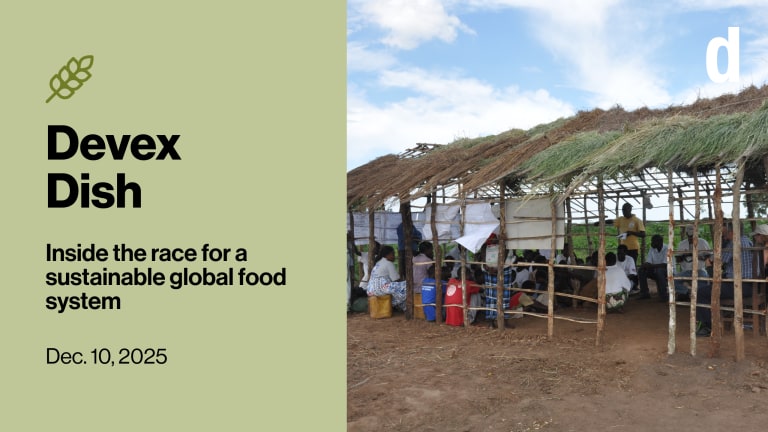
As Nairobi prepares to host the fifth session of the United Nations Environment Assembly, Kenyan pressure groups are demanding an end to unsafe food from the country’s markets and farms.
Get the inside track on how agriculture, nutrition, sustainability, and more are intersecting to remake the global food system in this weekly newsletter.
The country’s National Food And Nutrition Security Policy sets out actions to address food safety concerns, such as products that are substandard, laced with chemicals, or contaminated. But environmental and food activists said these have yet to be implemented.
According to research by Consumer Grassroots Association, a Kenyan nonprofit, pesticides not only pose a health risk to consumers but also threaten the farmers who are exposed to them. In a CGA survey of Kenyan consumers last year, 87% of respondents identified pesticide use and misuse as major food safety concerns.
“Kenyans are concerned about the safety of the food they are consuming, and they are worried that the respective county governments are not doing enough to guarantee a response to the issue,” Dennis Adison Ouma, the founder of Fit and Healthy Citizen — a food, health, and wellness consultancy — said during a virtual discussion presented by CGA last week.
Lobbyists estimate that at least 32% of pesticide active ingredients that are registered with the government and sold in Kenya have been withdrawn from the European market amid fears of impacts on human and environmental health.
“Healthy foods begin from healthy soils, water, air, and the environment. Food cannot be safe if it is produced in an unhealthy environment,” Ouma said.
In 2019, pressure groups led by the organization Route to Food issued a petition to the Kenyan government demanding the removal of harmful agrochemicals from the country’s food system.
The government responded by referring the issue to the parliamentary health committee, which gave the Pest Control Products Board 90 days to undertake an analysis of these pesticides with the aim of issuing a ban, according to Claire Nasike, a food campaigner at Greenpeace Africa, which launched a followup petition in 2021.
Though the health committee assembled a task force to review these pesticides, Nasike said nothing else has been done since then.
“There has been some action around the petitions but not as fast as we would have liked as Kenyans. We are hoping that maybe this year the government can actually make a move and ban some of these pesticides that have been proven to be harmful,” she said.
The World Health Organization estimates that 600 million people fall ill after eating contaminated food and 420,000 die each year globally. Africa has the world’s highest per capita incidence of food illnesses, causing 91 million cases annually.
Alice Kemunto, the director at CGA, said that about 137,000 people in Africa die every year due to food-related illnesses.
“Kenyans are a worried lot when it comes to choosing what to consume,” she said. “They are not sure of how safe their food is … because research has proven that they contain high levels of harmful residue.”
During a media briefing in December, the Biodiversity and Biosafety Association of Kenya said 24 agrochemicals in the Kenyan market have the potential to cause cancer and another 24 have the capacity to cause damaging genetic changes. Others are said to negatively affect hormones and reproduction.
Anne Maina, the national coordinator at BIBA Kenya, said imports of chemicals into Kenya rose by 144% between 2015 and 2018, with agrochemicals for use in the country’s food systems constituting the majority.
Farmers blame the lack of agriculture extension — a service that the government is expected to provide, which can help with environmentally safe farming technologies — for the increasing load of harmful agrochemicals in the country.
But Grace Mugo, the head of extension services at the Ministry of Agriculture, Livestock, Fisheries & Cooperatives, said the government is creating digital hubs at the county level to serve farmers and help them identify and reject harmful agrochemicals.
She said the government is also aware that dealers of retail agricultural products may be responsible for these agrochemicals reaching farmers.
“The regulations that the government has put in place are sufficient to protect the country against unsafe foods and agrochemicals. All that is needed is to upscale agriculture extension services,” she said.
In 2020, a UNEA report found that the world had not managed to reduce adverse effects on human and environmental health caused by chemicals and waste management.
Pressure groups said the main reason this has not been achieved is that double standards are used by UNEA and similar bodies that have the political influence to hold governments accountable for the production of harmful pesticides.
Will Africa’s year of nutrition bear fruit? (Pro)
The African Union has declared 2022 as its year of nutrition. Though analysts said this year's theme could help the AU to emphasize the importance of nutrition they noted that the continent needs to take decisive action to meet its targets.
For instance, the fifth UNEA session is convening under the theme “Strengthening Actions for Nature to Achieve the Sustainable Development Goals.” Some UNEA members are the countries of origin for harmful chemicals flooding Africa’s markets — but these are not used back home, Nasike said.
Instead, countries export these chemicals to the developing world. Then, the farmers who use them cannot export food that exceeds the maximum residue limit into Europe or other lucrative markets.
“I like to call this an injustice, because there is no way of explaining why a country would produce a certain chemical but not use it in their country of origin, and then export it,” Nasike said, adding that “UNEA should look beyond some of the conventions that exist on agrochemicals and do what is right for the environment and nature.”









